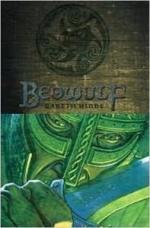{The monster is amazed at Beowulf’s strength.}
In
any man else had he ever encountered:
Fearful
in spirit, faint-mooded waxed he,
45 Not off
could betake him; death he was pondering,
{He is anxious to flee.}
Would
fly to his covert, seek the devils’ assembly:
His
calling no more was the same he had followed
Long
in his lifetime. The liege-kinsman worthy
{Beowulf recalls his boast of the evening, and determines to fulfil it.}
Of
Higelac minded his speech of the evening,
50 Stood
he up straight and stoutly did seize him.
His
fingers crackled; the giant was outward,
The
earl stepped farther. The famous one minded
To
flee away farther, if he found an occasion,
And
off and away, avoiding delay,
55 To fly
to the fen-moors; he fully was ware of
The
strength of his grapple in the grip of the foeman.
{’Twas a luckless day for Grendel.}
’Twas
an ill-taken journey that the injury-bringing,
Harrying
harmer to Heorot wandered:
{The hall groans.}
The
palace re-echoed; to all of the Danemen,
60 Dwellers
in castles, to each of the bold ones,
Earlmen,
was terror. Angry they both were,
Archwarders
raging.[2] Rattled the building;
[28] ’Twas a marvellous wonder that the
wine-hall withstood then
The
bold-in-battle, bent not to earthward,
65 Excellent
earth-hall; but within and without it
Was
fastened so firmly in fetters of iron,
By
the art of the armorer. Off from the sill there
Bent
mead-benches many, as men have informed me,
Adorned
with gold-work, where the grim ones did struggle.
70 The Scylding
wise men weened ne’er before
That
by might and main-strength a man under heaven
Might
break it in pieces, bone-decked, resplendent,
Crush
it by cunning, unless clutch of the fire
In
smoke should consume it. The sound mounted upward
{Grendel’s cries terrify the Danes.}
75 Novel
enough; on the North Danes fastened
A
terror of anguish, on all of the men there
Who
heard from the wall the weeping and plaining,
The
song of defeat from the foeman of heaven,
Heard
him hymns of horror howl, and his sorrow
80 Hell-bound
bewailing. He held him too firmly
Who
was strongest of main-strength of men of that era.
[1] B. and t.B. emend so as to make lines 9 and 10 read: Never in his life, earlier or later, had he, the hell-thane, found a braver hero.—They argue that Beowulf’s companions had done nothing to merit such encomiums as the usual readings allow them.
[2] For ‘reethe ren-weardas’
(771), t.B. suggests ‘reethe, renhearde.’
Translate: They were
both angry, raging and mighty.




